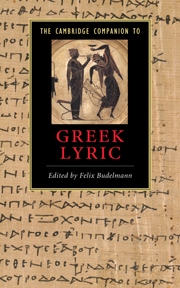Book contents
- Frontmatter
- Introducing Greek lyric
- Part I: Contexts and topics
- 1 Genre, occasion and performance
- 2 Greek lyric and the politics and sociologies of archaic and classical Greek communities
- 3 Greek lyric and gender
- 4 Greek lyric and the place of humans in the world
- 5 Greek lyric and early Greek literary history
- 6 Language and pragmatics
- 7 Metre and music
- Part II: Poets and traditions
- Part III: Reception
- Chronology of select melic, elegiac and iambic poets
- Further Reading
- Glossary
- List of works cited
- Index
5 - Greek lyric and early Greek literary history
from Part I: - Contexts and topics
Published online by Cambridge University Press: 28 May 2010
- Frontmatter
- Introducing Greek lyric
- Part I: Contexts and topics
- 1 Genre, occasion and performance
- 2 Greek lyric and the politics and sociologies of archaic and classical Greek communities
- 3 Greek lyric and gender
- 4 Greek lyric and the place of humans in the world
- 5 Greek lyric and early Greek literary history
- 6 Language and pragmatics
- 7 Metre and music
- Part II: Poets and traditions
- Part III: Reception
- Chronology of select melic, elegiac and iambic poets
- Further Reading
- Glossary
- List of works cited
- Index
Summary
Placing lyric poetry within the early history of Greek literature is a difficult task for at least two reasons. The first is that, as the introduction to this volume makes clear, a variety of very different poems, songs, recitations and dances constitute the modern category of 'Greek lyric': these performances were not necessarily thought to have much in common in the archaic period. Aristotle offered no discussion or categorisation of them as a group in his Poetics; and even in Alexandria, where the term 'lyric' was employed as a means of systematising the canon of ancient authors, scholars tended to subdivide lyric poetry into more consistent and identifiable sub-genres, such as the paean, the victory ode, or the wedding song. Writing about lyric poetry in relation to other forms of literature in ancient Greece can thus easily lead to a strait-jacketing of a rich and disparate body of songs and recitations, whose status as a poetic genre is very doubtful indeed.
The second problem concerns the notion of 'literary history', which tends to promote narratives of development. The most influential study of early Greek lyric in the twentieth century was arguably the third chapter of Bruno Snell's Discovery of the Mind: The Greek Origins of European Thought (first published in German in 1946): according to Snell, lyric poets discovered a sense of the personal 'I' and of their own subjectivity, thus effecting an important transition from the impersonal and objective worldview of epic to the later developments of Greek philosophy, drama, and ultimately modern European thought.
- Type
- Chapter
- Information
- The Cambridge Companion to Greek Lyric , pp. 95 - 113Publisher: Cambridge University PressPrint publication year: 2009
- 7
- Cited by

